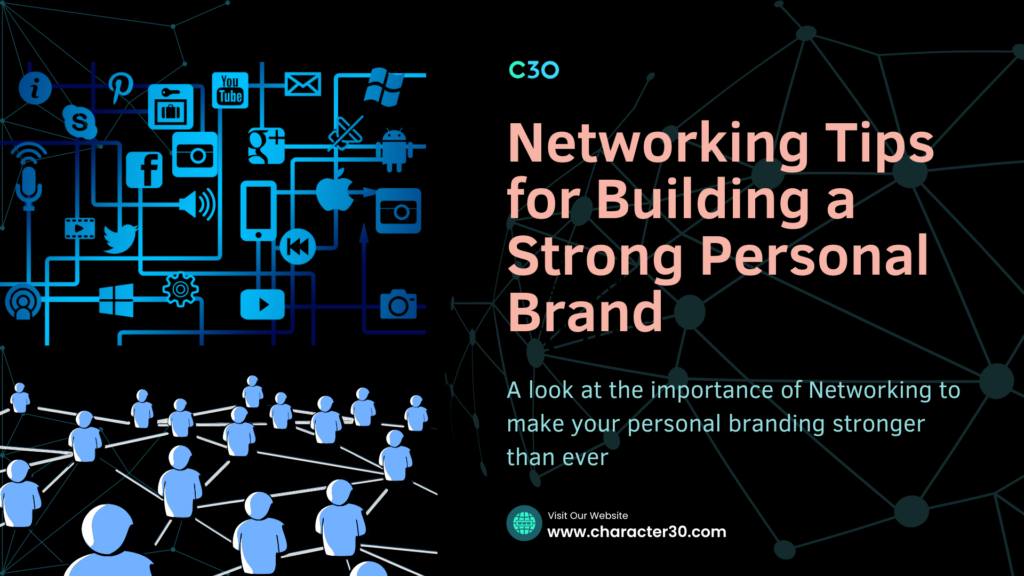
In the increasingly connected world of today, networking has evolved beyond simple introductions and exchanges of business cards. It has become a sophisticated art that plays a pivotal role in building and sustaining a powerful personal brand. Whether you’re a seasoned professional or an emerging talent, understanding how to leverage networking effectively is key to enhancing your personal brand and achieving your professional goals.
The Symbiotic Relationship Between Networking and Personal Branding
Strategies for Effective Networking
- Defining Your Brand Identity
- Building a Strategic Network
- Leveraging Online Platforms
- Engaging in Offline Networking
- Adding Value to Your Network
- Consistency is Key
Tips for Effective Online Networking
Tips for Effective Offline Networking
The Symbiotic Relationship Between Networking and Personal Branding
Personal branding is about crafting and communicating your unique value proposition to the world. It’s the reputation you cultivate over time, representing your skills, experiences, values, and vision. Networking, on the other hand, is the means by which you share that brand with others and expand your influence.
The relationship between networking and personal branding is symbiotic. Networking amplifies your brand, and a strong personal brand makes networking more effective. When these two elements work in tandem, they create a cycle of growth and opportunity that can propel your career forward.
Strategies for Effective Networking
1. Defining Your Brand Identity
Before you can effectively network, you must have a clear understanding of your brand identity. What do you stand for? What are your core values and expertise? Having a well-defined personal brand helps you communicate consistently and with confidence, making your networking efforts more impactful. Consider crafting an elevator pitch that encapsulates your brand succinctly.
2. Building a Strategic Network
Not all networks are created equal. To truly benefit your personal brand, your network should be strategic, comprising individuals who can offer insights, opportunities, and support aligned with your professional goals. This means seeking out mentors, peers, and even potential mentees who reflect your values and aspirations. Online platforms like LinkedIn are invaluable for this, as they allow you to connect with industry leaders and influencers who might otherwise be out of reach.
3. Leveraging Online Platforms
In the digital age, online networking is as crucial as face-to-face interactions. Platforms like LinkedIn, Twitter, and niche forums offer unparalleled opportunities to connect with professionals across the globe. To maximize these opportunities, it’s important to engage actively—share industry insights, comment on relevant discussions, and showcase your expertise through posts and articles. Regularly updating your profiles with your latest achievements and thoughts will keep your brand fresh in the minds of your network.
4. Engaging in Offline Networking
Despite the dominance of digital communication, offline networking remains a powerful tool for personal branding. Attending industry conferences, workshops, and networking events allows you to make personal connections that can be more memorable and impactful than online interactions alone. When engaging in offline networking, it’s important to be present and authentic. Listen actively, ask thoughtful questions, and follow up with new contacts to solidify the relationship.
5. Adding Value to Your Network
Networking should not be a one-sided effort. The most successful networkers are those who offer value to others, whether through sharing knowledge, providing introductions, or offering support. By becoming a resource for your network, you not only strengthen your relationships but also enhance your personal brand as someone who is knowledgeable, helpful, and trustworthy.
6. Consistency is Key
Consistency is critical in both networking and personal branding. Regularly engaging with your network—whether through social media, emails, or in-person meetings—helps maintain and grow your relationships. It’s also important to consistently represent your brand across all platforms and interactions, ensuring that your message remains clear and aligned with your professional identity.
Tips for Effective Online Networking
Online networking requires a strategic approach to maximize its benefits. Here are some tips:
– Optimize Your Online Profiles: Ensure your LinkedIn, Twitter, and other professional profiles are fully optimized with your latest accomplishments, skills, and a professional photo. A well-crafted profile serves as your digital business card and can make a strong first impression.
– Engage Regularly: Don’t just passively observe online conversations—jump in and engage. Comment on posts, share relevant articles, and contribute your insights. This not only showcases your expertise but also keeps you visible to your network.
– Join Relevant Groups: Online groups and forums related to your industry are great places to network. Participate in discussions, offer your expertise, and connect with other members who share your interests.
– Be Authentic: In the online space, authenticity stands out. Be genuine in your interactions, and avoid the temptation to oversell yourself. People are more likely to connect with you if they see you as a real, approachable person.
Tips for Effective Offline Networking
Offline networking, though more traditional, remains incredibly effective. Here are some strategies:
– Attend Industry Events: Conferences, seminars, and workshops are excellent opportunities to meet industry leaders and peers. Come prepared with business cards and a clear idea of what you want to achieve.
– Practice Active Listening: When networking in person, active listening is key. Show genuine interest in others’ stories and experiences, and avoid dominating the conversation. This builds rapport and trust.
– Follow Up: After meeting someone in person, a follow-up email or LinkedIn message can help cement the connection. Reference something specific from your conversation to show that you were engaged and attentive.
– Be Present: In face-to-face networking, your presence is your brand. Pay attention to your body language, maintain eye contact, and exude confidence without arrogance.
Networking is not just about expanding your contact list; it’s about building meaningful relationships that can support and enhance your personal brand. Whether online or offline, effective networking requires a strategic, consistent approach, grounded in authenticity and a clear understanding of your brand identity. By mastering the art of networking, you can significantly elevate your personal brand, opening doors to new opportunities and long-term success.




Leave a Reply